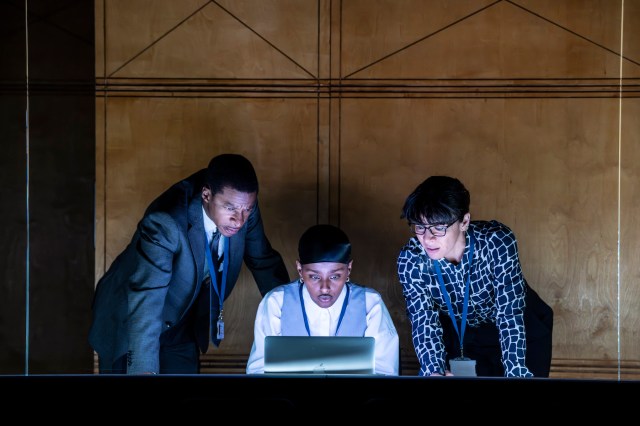Word-Play at the Royal Court – review
Rabiah Hussain’s drama premieres in the Theatre Upstairs

In 2021, when working on Word-Play, Rabiah Hussain was diagnosed with a brain tumour. Following her surgery, she experienced aphasia, which affects speech and literacy and the ability to understand words. This play shows how it’s all too easy to manipulate language for self-serving purposes and to use a lot of words while saying nothing – especially when it comes to ‘balance’. There’s also no doubt that Hussain loves words and their nuances.
Her largely plotless, satirical and, well, wordy 80-minute play is a scattered piece of work, consisting of a series of short scenes featuring repeated phrases that have seeped into the public consciousness, in particular “rivers of blood”. In the opening sequence, the Prime Minister (on his third marriage and famous for his messy hair) has made an offensive remark strongly suggested to be Islamophobic. His aides rush to try to salvage things by formulating an apology that isn’t an apology – it’s easier to claim that his remarks were taken out of context because who watches live TV these days?
Designer Rosanna Vize has transformed the Royal Court’s Upstairs space into what feels like a community centre with a tiled carpet, a mural on the wall and a few plastic chairs, the same as the ones on which the audience is sitting. It’s a space where everyone, in theory, can have their say about civic issues, but is often dominated by a few personalities.
Nimmo Ismail’s staging, mostly taking place in the large open space in the centre of the auditorium (the PM’s aides in their Westminster bubble bumble behind a glass window at the back of the auditorium) often feels ‘socially distanced’, as if highlighting the characters’ inability to connect with each other. The performances by the cast of five – Issam Al Ghussain, Kosar Ali, Simon Manyonda, Sirine Saba and Yusra Warsama – playing multiple characters who are shrugged off after they’ve had their moment, all give fluent performances and acquit themselves well with the satirical elements.
Among the scenarios, there’s a touching exchange between two women in a park about how they never think about what language they’re thinking in. A father tells his therapist about how he raised his sons to believe that “sticks and stones may break my bones but words will never hurt me”, which was the least wise thing he could have done. A man receiving training as a ‘see it, say it, sorted’ monitor questions what ‘normal’ behaviour is and his supervisor ties himself up in knots trying to explain.
Hussain’s cerebral and philosophical approach finally becomes emotional in the climactic monologue about a woman (played by Warsama) who takes her daughter Iman to her home country to visit her parents for an idyllic summer holiday. They collect stones to skim in the river and build ‘houses’ with, and she returns home with two favourites engraved with her name and her grandparents’ names in their native language. On returning to school, Iman is kept behind and she and her mother are subjected to passive-aggressive and downright aggressive questioning. What words would we use if we could intervene – and would they be any use?











